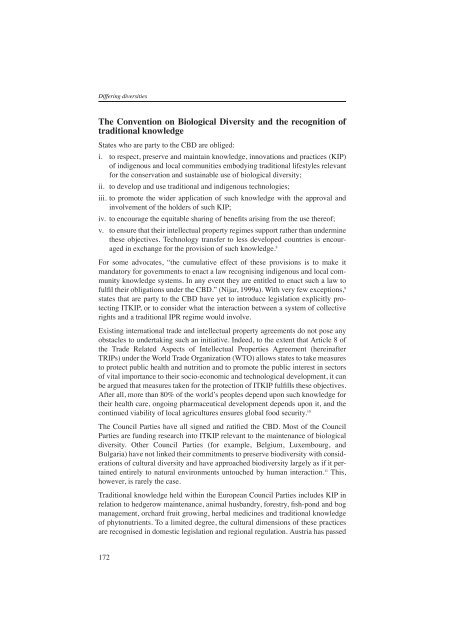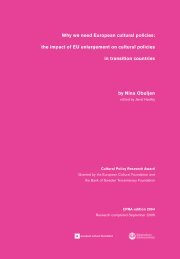Tony Bennett, Differing diversities - Council of Europe
Tony Bennett, Differing diversities - Council of Europe
Tony Bennett, Differing diversities - Council of Europe
Create successful ePaper yourself
Turn your PDF publications into a flip-book with our unique Google optimized e-Paper software.
<strong>Differing</strong> <strong>diversities</strong>The Convention on Biological Diversity and the recognition <strong>of</strong>traditional knowledgeStates who are party to the CBD are obliged:i. to respect, preserve and maintain knowledge, innovations and practices (KIP)<strong>of</strong> indigenous and local communities embodying traditional lifestyles relevantfor the conservation and sustainable use <strong>of</strong> biological diversity;ii. to develop and use traditional and indigenous technologies;iii. to promote the wider application <strong>of</strong> such knowledge with the approval andinvolvement <strong>of</strong> the holders <strong>of</strong> such KIP;iv. to encourage the equitable sharing <strong>of</strong> benefits arising from the use there<strong>of</strong>;v. to ensure that their intellectual property regimes support rather than underminethese objectives. Technology transfer to less developed countries is encouragedin exchange for the provision <strong>of</strong> such knowledge. 8For some advocates, “the cumulative effect <strong>of</strong> these provisions is to make itmandatory for governments to enact a law recognising indigenous and local communityknowledge systems. In any event they are entitled to enact such a law t<strong>of</strong>ulfil their obligations under the CBD.” (Nijar, 1999a). With very few exceptions, 9states that are party to the CBD have yet to introduce legislation explicitly protectingITKIP, or to consider what the interaction between a system <strong>of</strong> collectiverights and a traditional IPR regime would involve.Existing international trade and intellectual property agreements do not pose anyobstacles to undertaking such an initiative. Indeed, to the extent that Article 8 <strong>of</strong>the Trade Related Aspects <strong>of</strong> Intellectual Properties Agreement (hereinafterTRIPs) under the World Trade Organization (WTO) allows states to take measuresto protect public health and nutrition and to promote the public interest in sectors<strong>of</strong> vital importance to their socio-economic and technological development, it canbe argued that measures taken for the protection <strong>of</strong> ITKIP fulfills these objectives.After all, more than 80% <strong>of</strong> the world’s peoples depend upon such knowledge fortheir health care, ongoing pharmaceutical development depends upon it, and thecontinued viability <strong>of</strong> local agricultures ensures global food security. 10The <strong>Council</strong> Parties have all signed and ratified the CBD. Most <strong>of</strong> the <strong>Council</strong>Parties are funding research into ITKIP relevant to the maintenance <strong>of</strong> biologicaldiversity. Other <strong>Council</strong> Parties (for example, Belgium, Luxembourg, andBulgaria) have not linked their commitments to preserve biodiversity with considerations<strong>of</strong> cultural diversity and have approached biodiversity largely as if it pertainedentirely to natural environments untouched by human interaction. 11 This,however, is rarely the case.Traditional knowledge held within the <strong>Europe</strong>an <strong>Council</strong> Parties includes KIP inrelation to hedgerow maintenance, animal husbandry, forestry, fish-pond and bogmanagement, orchard fruit growing, herbal medicines and traditional knowledge<strong>of</strong> phytonutrients. To a limited degree, the cultural dimensions <strong>of</strong> these practicesare recognised in domestic legislation and regional regulation. Austria has passed172














